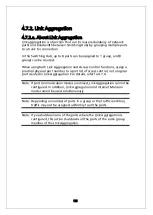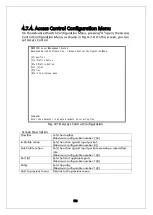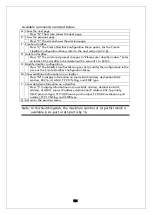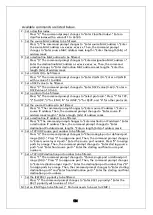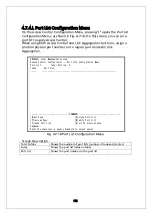
134
Available commands are listed below.
C Set a classifier index.
Press "C." The command prompt changes to "Enter Classifier Index>." Enter a
classifier index with a value of 1 to 65535.
S
Set the source MAC address to be filtered.
Press "S." The command prompt changes to "Enter source MAC address>." Enter
the source MAC address as xx:xx:xx:xx:xx:xx. Then, the command prompt
changes to "Enter source MAC address mask length>." Enter the length (bits) of
address mask.
D Set a destination MAC address to be filtered.
Press "D." The command prompt changes to "Enter designation MAC address>."
Enter the destination MAC address as xx:xx:xx:xx:xx:xx. Then, the command
prompt changes to "Enter destination MAC address mask length>." Enter the
length (bits) of address mask.
V Set a VLAN ID to be filtered.
Press "V." The command prompt changes to "Enter VLAN ID>." Enter a VLAN ID
with a value of 1 to 4094.
P
Set a DSCP value to be filtered.
Press "P." The command prompt changes to "Enter DSCP value (0-63)>." Enter a
DSCP value of 0 to 63.
R Set a protocol to be filtered.
Press "R." The command prompt changes to "Select protocol>." Press "1" for TCP,
"2" for UDP, "3" for ICMP, "4" for IGMP, "5" for RSVP, and "6" for other protocols.
O Set the source IP address to be filtered.
Press "O." The command prompt changes to "Enter source IP address>." Enter a
source IP address. Then, the command prompt changes to "Enter source IP
address mask length>." Enter a length (bits) of address mask.
E
Set a destination IP address to be filtered.
Press "E." The command prompt changes to "Enter destination IP address>." Enter
a destination IP address. Then, the command prompt changes to "Enter
destination IP address mask length>." Enter a length (bits) of address mask.
U Set a TCP/UDP source port number to be filtered.
Press "U." The command prompt changes to "Choose single port or defined port
range (S/D)>." Press "S" to assign one port. Then, the command prompt changes
to "Enter source layer 4 port>." Enter the source port number. Press "D" to assign
ports by a range. Then, the command prompt changes to "Enter starting source
port>" and "Enter final source port>." Enter the starting and final source port
numbers.
T
Set a TCP/UDP destination port number to be filtered.
Press "T." The command prompt changes to "Choose single port or defined port
range (S/D)>." Press "S" to assign one port. Then, the command prompt changes
to "Enter destination layer 4 port>." Enter the destination port number. Press "D"
to assign ports by a range. Then, the command prompt changes to "Enter starting
destination port>" and "Enter final destination port>." Enter the starting and final
destination port numbers.
I
Set the IEEE802.1p priority to be filtered.
Press "I." The command prompt changes to "Enter 802.1p priority>." Enter the
802.1p priority with a value of 0 to 7.
M Set an ICMP type to be filtered. (* Protocol needs to be set to ICMP.)






